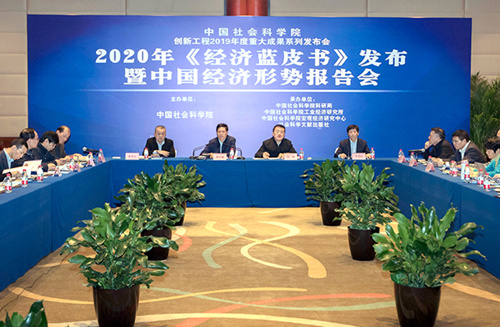
The launch event of the Blue Book on China’s economy in Beijing Photo: WU WENKANG/CSST
China’s economic growth rate is expected to be around 6.1% in 2019, according to Blue Book of China’s Economy, Economy of China: Analysis and Forecast (2020) released on Dec. 9 in Beijing.
The general report of the Blue Book also shows that the growth rate of global economy and trade slowed down significantly in 2019 and the economic growth rates of major economies generally declined.
In his speech at the launch event, Xie Fuzhan, president of the Chinese Academy of Social Sciences (CASS), said that in light of the severe and complicated external environment and the arduous reform and development tasks since the beginning of this year, the CPC Central Committee with Comrade Xi Jinping as the core has adhered to the guideline of making progress while maintaining stability and adhered to new concepts of development and promoted high-quality development. In order to further stabilize employment, finance, foreign trade, foreign capital, investment and expectations, a series of macro and structural policies have been introduced, especially regarding further reform and opening up.
Xie continued that China’s economy has maintained stable operation, the economic structure has continued to be optimized, and new driving forces have grown rapidly. In addition, remarkable progress has been made in risk management, poverty reduction and pollution control. The pace of reform and opening up has been significantly accelerated, and the people’s livelihood and welfare have continued to improve, laying a decisive foundation for completing the process of building a moderately prosperous society in all respects next year.
Xie pointed out that the current adjustment of the domestic economic structure still faces many difficulties. We must recognize, face up to, and resolve these difficulties to maintain the sustained and healthy development of our economy. It is necessary to boost confidence and correctly recognize that China’s development is still in an important period of strategic opportunities. The basic trend of stable economic growth and long-term improvement remains unchanged. The basic characteristics of economic resilience, full potential and large room for manoeuvre remain unchanged. The good foundation and conditions for sustained growth, and the trend of the adjustment and optimization of the economic structure have not changed.
To overcome various risks and challenges and to resolve the institutional and structural contradictions that restrict China’s economic development, Xie concluded that we must implement new concepts of development, concentrate efforts on our own businesses, unswervingly deepen reform and opening up, and pursue high-quality development.
Referring to the Blue Book, Li Xuesong, deputy director of the Institute of Industrial Economics at CASS, said that the global economy is expected to pick up modestly in 2020, but there is increasing instability and uncertainty, as well as risks of downsides. China’s economic growth rate is expected to be about 6% in 2020, and the consumer price index will rise by about 3.4%.
Facing the coexistence of downward pressure on the economy and institutional and structural contradictions along with increasing external risks, the Blue Book proposes that to maintain economic growth and employment at a reasonable level in 2020, we must further strengthen forward-looking, targeted and flexible macro policy, appropriately increase counter-cyclical adjustments, make good use of such policy tools as finance, currency and employment, and strengthen policy coordination and cooperation, striving for progress while maintaining stability.
Specifically, a proactive fiscal policy should increase force and efficiency, and a prudent monetary policy should be flexible, moderate and prudent. The Blue Book also suggests implementing employment-first policies and optimizing the employment supply structure. On the basis of strengthening and improving macroeconomic regulation and control, we should continue to deepen the supply-side structural reforms.
Fiscal policy is an important aspect of macroeconomic regulation and control, and it plays an irreplaceable role especially in the areas of investment stability, structural adjustment and people’s livelihood.
The Blue Book says that the fiscal policy of 2020 must optimize and implement tax and fee reduction policies and effectively reduce the burden of corporate taxes and fees. The book also suggests adjusting the structure of fiscal expenditure based on performance and increasing support for manufacturing transformation and upgrading as well as technological transformation to stimulate the internal motivation and innovation vitality of enterprises.
According to the Blue Book, it is also advisable to appropriately raise the deficit rate and increase bond issuance, focusing on supporting vocational education, childcare, medical care, elderly care and other causes concerning people’s livelihoods, as well as technology, infrastructure, ecology and other fields.
In terms of GDP, prices, balance of payments, employment and other indicators, China’s economy has operated in a reasonable range in 2019, according to Zhu Baoliang, chief economist at China’s State Information Center.
The main problem of China’s economic development is still structural, Zhu noted. If this problem is not solved, the microeconomic foundation of the macro economy will not be solid, making it very difficult for macroeconomic regulation and control to play a role. In short, it is necessary to implement a macro-stability policy with supply-side structural reform as the main line and to implement counter-cyclical adjustments in the short term.
Zhang Ping, a research fellow from the Institute of Economics at CASS, said that economic transformation must start with two major factors in the industry: first, how the industry can innovate to obtain high profits; second, how to carry out new reforms and the opening up of the service industry, opening up more space for high-end service industries such as science, education, culture, health and sports while improving the efficiency of the service industry overall.
(Edited by JIANG HONG)

